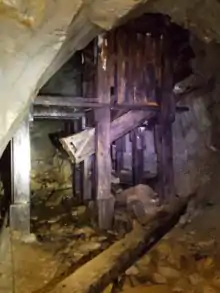Ore shoot
An ore shoot is a mass of ore deposited in a vein.The ore shoot consists of the most valuable part of the ore deposit. An ore shoot is the area of concentration containing primary ore along the veins present in the rocks.[1]

Veins
Along an ore shoot, there is a rich gathering of different minerals in a vein. The veins resemble a pipe or a chimney in structure. Veins are displaced mainly vertically oriented but also horizontal with large veins extending approximately 30 m (100 ft) horizontally and 150 m (500 ft) vertically.[2] The metal contents in ore shoots are distributed in areas that vary in deposit sizes.
Sizes and structure
The circumference of deposit sizes can range from a few meters, to many kilometres. A structure may consist of multiple ore shoots with some veins or lodes being as thick as 1.5–6.1 m (5–20 ft), and extending to thousands of feet horizontally and vertically.[2]
Locations
There are complex stratigraphic historical parameters required in understanding how ore shoots are formed. Rocks go through numerous ductile and brittle deformation events before they become mineralized. The different locations of ore shoots in Australia are determined by investigating the internal architecture of the rock pile. The longest shoots occur on the flanks of the basalt flows with the largest lateral extent. The geometry and internal structure of the basalt flows is important for predicting the likelihood and extent of the ore shoots.[3]
References
- "Oreshoot - Mining Fundamentals". AZoMining.com. 2014-03-26. Retrieved 2020-03-14.
- "Oreshoot - Mining Fundamentals". AZoMining.com. 2014-03-26. Retrieved 2020-03-14.
- Squire, Richard J.; Robinson, Jamie A.; Rawling, Timothy J.; Wilson, Christopher J. L. (2008-08-01). "Controls on Ore Shoot Locations and Geometries at the Stawell Gold Mine, Southeastern Australia: Contributions of the Volcanosedimentary, Alteration, and Structural Architecture". Economic Geology. 103 (5): 1029–1041. doi:10.2113/gsecongeo.103.5.1029. ISSN 0361-0128.